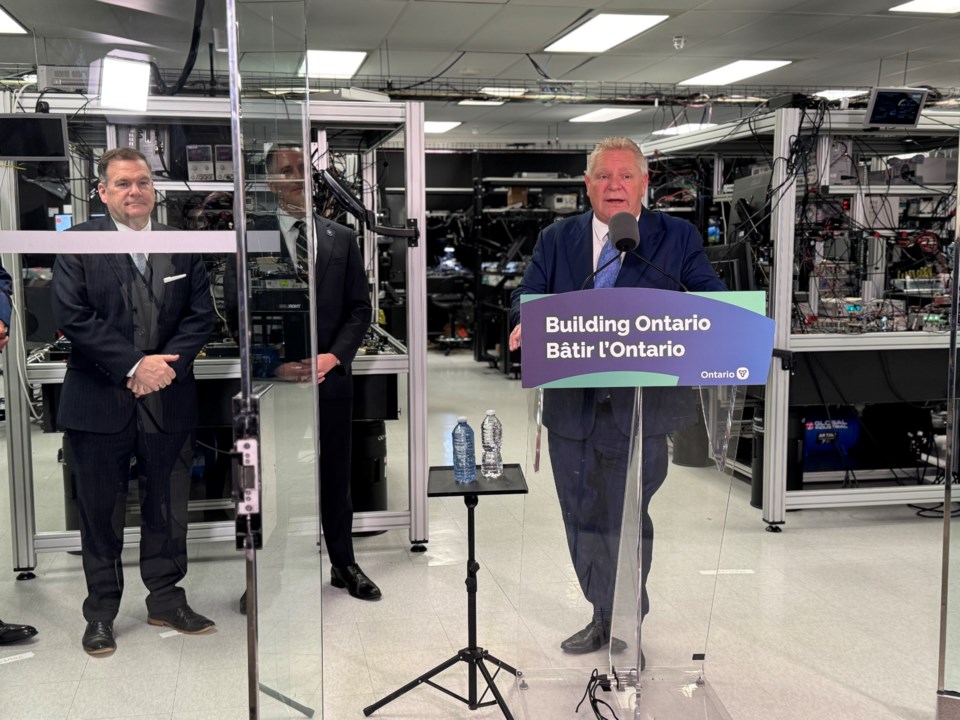Ontario could lose up to 500,000 jobs if president-elect Donald Trump follows through on his threat to levy a 25 per cent tariff on Canadian exports to the U.S., according to Premier Doug Ford.
Ford held a press conference on Tuesday to tout "Fortress Am-Can," his plan for a stronger security alliance between America and Canada. The premier has been aggressively promoting the ties between Ontario and the U.S. in press conferences and American TV interviews to dissuade Trump from following through on his tariff threat.
Ford has also been publicly musing that if Trump does follow through, he may trigger an early election in Ontario because he does not have a mandate from the electorate to spend "tens of billions" of dollars on a plan to counter the tariff's effect on the Ontario economy. Ford currently leads a majority government and the election is not scheduled until June 2026.ca
Asked Tuesday how much his government might spend responding to the potential tariffs, Ford said it would depend on which sectors are affected, something he expects to find out soon. Trump will be inaugurated next week. The president-elect has described his plan as a single "25 per cent Tariff on ALL products coming into the United States."
Ford said Ontario civil servants estimate the tariffs could cost Ontario up to 500,000 jobs — about six per cent of the province's workforce — at a maximum.
"This is serious. It's unprecedented, and let's hope it doesn't cost 500,000 jobs," he said.
Ford was also asked how he would spend billions to prop up the economy and if he was considering setting up an income replacement plan like the federal government's pandemic-era CERB program, subsidizing targeted companies or providing general economic stimulus.
"We'll determine that when we see the tariffs come at us, and what sectors, and what needs, and it's really a good conversation that needs to be had once these tariffs come in," he said, adding he'll "sit down with the sectors and ask what they need the most."
At Queen's Park Tuesday afternoon, Ford met with federal Finance Minister Dominic LeBlanc, who praised the premier's leadership on the U.S. trade issue.
Asked if the federal government is contemplating spending billions on a tariff response as Ford is, LeBlanc said that he and Ford discussed working together to support workers and businesses once the scale and impact of the American tariffs are known, but declined to offer specifics. While Leblanc said modelling is being done by the federal government to estimate potential job losses, he gave no specifics.
"I think people need to know that we'll work together, as we always have, with the provinces and territories, to support businesses and workers," LeBlanc said. "This is a circumstance that Canadian industry and Canadian workers didn't create. If the American government takes this decision, our obligation is to work together and to support the economy of the country, but also to respond in a firm, unified way."
LeBlanc stressed that Trump's tariffs won't be good for the U.S. economy either.
Ford's uncertainty about the potential impacts is shared by some of the country's leading economists.
BMO Economics issued a report estimating that an across-the-board 25 per cent tariff with only limited retaliation from Canada would shave nearly 2 percentage points from Canada's GDP growth, but much depends on whether any sectors are exempted and how Canada and the rest of the world retaliate and if the tariff regime is scaled back.
Ontario, it notes, is particularly vulnerable to tariffs on manufactured goods, which the economists believe are less likely to be exempted by the incoming administration than energy exports.
"In Ontario, for example, U.S. goods exports top 17 per cent of GDP with a wide range of industries (e.g., autos, machinery, metals and consumer goods) carrying shares in excess of one per cent of GDP," they wrote. "Uncertainty weighs here as well, particularly for autos, where the supply chain is deeply integrated across the border."
The same report said it "would be little surprise" to see some fiscal stimulus in response to tariffs — the kind of new government spending Ford is describing — but the economists suggested that could be about $15 billion across the country rather than from the Ontario provincial government alone.
Robert Kavcic, a BMO senior economist, told The Trillium he would expect to see provincial stimulus "targeted at businesses in the line of tariff fire," such as direct payments and hiring incentives to companies in affected industries, and perhaps more broad-based payments to Ontarians which, he added, "may not be the best fiscal policy."
"The good news is Ontario has come into this period in a solid fiscal position and has scope to run a stimulus program if needed," he added.
The bank's chief economist, Douglas Porter, speaking last week at a forum of chief economists hosted by the Economic Club of Canada, warned that "almost any reasonable response we would have to 25 per cent tariffs would rebound on us and be painful as well."
For instance, a typical response to a trade war would be export taxes on food and energy, something he said is unlikely to "fly" in Canada's political reality, particularly in Alberta.
Avery Shenfeld, chief economist at CIBC Capital Markets, was less certain about the impact, quipping that anyone who says they can predict it is "lying" because there is no precedent for sweeping 25-per-cent tariffs.
In some cases, industries will pass on the cost of the tariffs to U.S. consumers, and U.S. consumers will have to pay it, but in others, the U.S. can substitute for what Canada produces, so Canadian companies will quickly lose market share, he explained.
"What we do know is, without being able to put a decimal place on this, that the impact is large," Shenfeld said, adding, "it's bad," and "it's enormous."
—With files from Alan Hale




